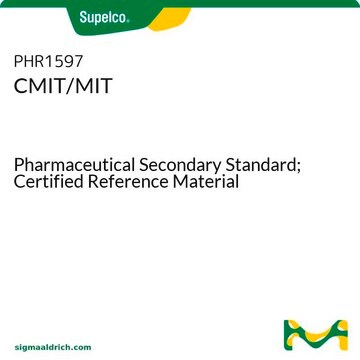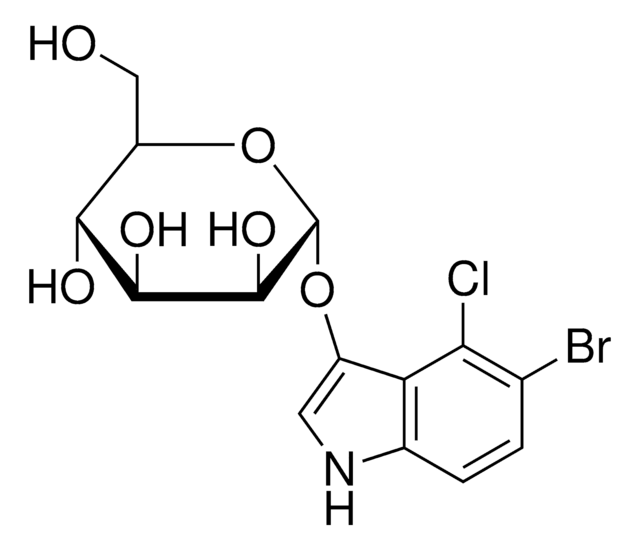推荐产品
一般說明
Methylisothiazolinone, also known as 2-Methyl-4-isothiazolin-3-one, is a potent synthetic biocide and preservative belonging to the group of isothiazolinones. It effectively controls microbial growth and acts as a broad-spectrum antibiotic, similar to the function and performance of bromonitrodioxane. It is effective against both gram-positive and gram-negative bacteria, as well as yeast and fungi. Additionally, it serves as an antifouling biocide, an antimicrobial agent, and an antifungal agent. 2-Methyl-4-isothiazolin-3-one is utilized in microbiology and cell biology applications to effectively prevent the growth of bacterial contaminants, ensuring the purity of cell lines.
應用
Methylisothiazolinone (MIT) has been used:
- in research on the effects of the N-methyl D-aspartate (NMDA) receptor antagonist kynurenic acid on human cortical development [1]
- as a cytotoxic substance to investigate its effect on bronchial epithelial cells (BEAS-2B cells) and role in apoptotic cell death(2)
- to research the effects of tyrosine phosphorylation on focal adhesion kinase (FAK) activity in the development of neural axons and dendrites(3)
生化/生理作用
Mode of Action: Inhibits the growth of microorganisms by disrupting the normal function of microbial cells and interferes with essential cellular processes.
Activity Spectrum: Active against Gram-positive and Gram-negative bacteria, as well as fungi, when used in combination with methylchloroisothiazolinone (MCI)
Activity Spectrum: Active against Gram-positive and Gram-negative bacteria, as well as fungi, when used in combination with methylchloroisothiazolinone (MCI)
特點和優勢
- Ready available solution reduce the need for preparation time
- Commonly used in Cell Biology and Biochemical applications
- High quality antibiotic suitable for mulitple research applications
其他說明
For additional information on our range of Biochemicals, please complete this form.
訊號詞
Danger
危險分類
Acute Tox. 4 Oral - Aquatic Chronic 2 - Eye Dam. 1 - Skin Corr. 1A - Skin Sens. 1
安全危害
儲存類別代碼
8B - Non-combustible corrosive hazardous materials
水污染物質分類(WGK)
WGK 3
閃點(°F)
Not applicable
閃點(°C)
Not applicable
Zhengxi Wei et al.
Toxicology letters, 338, 67-77 (2020-12-09)
Chemical-peptide conjugation is the molecular initiating event in skin sensitization. The OECD test guideline uses a high-performance liquid chromatography/ultraviolet (HPLC/UV) detection method to quantify chemical-peptide conjugation in a direct peptide reactivity assay (DPRA), which measures the depletion of two synthetic
Shen Du et al.
The Journal of neuroscience : the official journal of the Society for Neuroscience, 22(17), 7408-7416 (2002-08-28)
Neurodegenerative disorders in humans may be triggered or exacerbated by exposure to occupational or environmental agents. Here, we show that a brief exposure to methylisothiazolinone, a widely used industrial and household biocide, is highly toxic to cultured neurons but not
Eun-Jung Park et al.
Toxicology in vitro : an international journal published in association with BIBRA, 62, 104661-104661 (2019-10-21)
Methylisothiazolinone (MIT) has been used in wide spectrum of fields due to its ability to inhibit microbial proliferation with low toxicity. Meanwhile, in Korea, the concern about the hazardous effects of MIT was amplified by the occurrence of patients that
Erol Capkin et al.
Chemosphere, 182, 720-729 (2017-05-23)
Triclosan (TRC), chloroxylenol (PCMX) and methylisothiazolinone (MIT) have been commonly used as an antimicrobial in soaps while borax (BRX) is used in household cleaning. After using these chemicals, they are washed down drains and getting into the aquatic ecosystem in
Mari Paz Castanedo-Tardana et al.
Dermatitis : contact, atopic, occupational, drug, 24(1), 2-6 (2013-01-24)
The preservative methylisothiazolinone (MI) is the American Contact Dermatitis Society Contact Allergen of the Year for 2013. Because the use of MI in cosmetics and toiletries in the United States rises, MI exposure also rises. Although it might seem likely
我们的科学家团队拥有各种研究领域经验,包括生命科学、材料科学、化学合成、色谱、分析及许多其他领域.
联系技术服务部门









